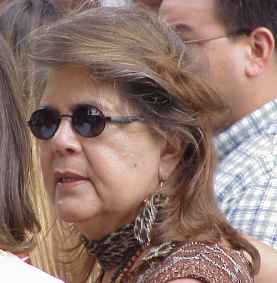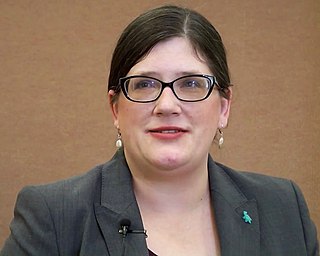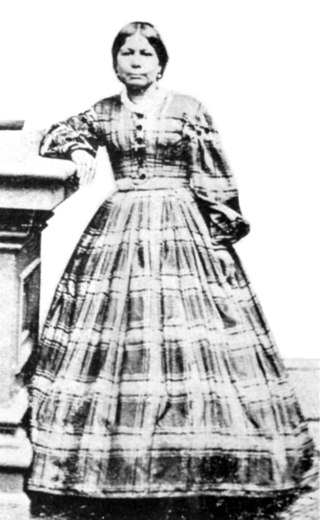Related Research Articles

Wilma Pearl Mankiller was a Indigenous American activist, social worker, community developer and the first woman elected to serve as Principal Chief of the Cherokee Nation. Born in Tahlequah, Oklahoma, she lived on her family's allotment in Adair County, Oklahoma, until the age of 11, when her family relocated to San Francisco as part of a federal government program to urbanize Indigenous Americans. After high school, she married a well-to-do Ecuadorian and raised two daughters. Inspired by the social and political movements of the 1960s, Mankiller became involved in the Occupation of Alcatraz and later participated in the land and compensation struggles with the Pit River Tribe. For five years in the early 1970s, she was employed as a social worker, focusing mainly on children's issues.

The Schaghticoke are a Native American tribe of the Eastern Woodlands who historically consisted of Mahican, Potatuck, Weantinock, Tunxis, Podunk, and their descendants, peoples indigenous to what is now New York, Connecticut, and Massachusetts. The remnant tribes amalgamated in the area near the Connecticut-New York border after many losses, including the sale of some Schaghticoke and members of neighboring tribes into slavery in the Caribbean in the 1600s.

Arthur Vivian Watkins was a Republican U.S. Senator from Utah, serving two terms from 1947 to 1959. He was influential as a proponent of terminating federal recognition of American Indian tribes, in the belief that they should be assimilated and all treaty rights abrogated. In 1954 he chaired the Watkins Committee, which led to the censure of Senator Joseph McCarthy, who had made extensive allegations of communist infiltration of government and art groups. Watkins voted in favor of the Civil Rights Act of 1957.

The Little Traverse Bay Bands of Odawa Indians is a federally recognized Native American tribe of Odawa. A large percentage of the more than 4000 tribal members continue to reside within the tribe's traditional homelands on the northwestern shores of the state of Michigan's Lower Peninsula. The historically delineated reservation area, located at 45°21′12″N84°58′41″W, encompasses approximately 336 square miles (870 km2) of land in Charlevoix and Emmet counties. The largest communities within the reservation boundaries are Harbor Springs, where the tribal offices are located; Petoskey, where the Tribe operates the Odawa Casino Resort; and Charlevoix.

Bina Agarwal is an Indian development economist and Professor of Development Economics and Environment at the Global Development Institute at The University of Manchester. She has written extensively on land, livelihoods and property rights; environment and development; the political economy of gender; poverty and inequality; legal change; and agriculture and technological transformation.

Native American recognition in the United States, for tribes, usually means being recognized by the United States federal government as a community of Indigenous people that has been in continual existence since prior to European contact, and which has a sovereign, government-to-government relationship with the Federal government of the United States. In the United States, the Native American tribe is a fundamental unit of sovereign tribal government. This recognition comes with various rights and responsibilities. The United States recognizes the right of these tribes to self-government and supports their tribal sovereignty and self-determination. These tribes possess the right to establish the legal requirements for membership. They may form their own government, enforce laws, tax, license and regulate activities, zone, and exclude people from tribal territories. Limitations on tribal powers of self-government include the same limitations applicable to states; for example, neither tribes nor states have the power to make war, engage in foreign relations, or coin money.
Since the 19th century, men have taken part in significant cultural and political responses to feminism within each "wave" of the movement. This includes seeking to establish equal opportunities for women in a range of social relations, generally done through a "strategic leveraging" of male privilege. Feminist men have also argued alongside writers like bell hooks, however, that men's liberation from the socio-cultural constraints of sexism and gender roles is a necessary part of feminist activism and scholarship.
The Advisory Council on California Indian Policy (ACCIP) was created by an act of the United States Congress and signed by President George H. W. Bush on October 14, 1992. It provided for the creation of a special advisory council made up of eighteen members with the purpose of studying the unique problems that California Native Americans face in receiving federal acknowledgment. Additionally, they were given the task of studying the social and economic conditions of California natives, “characterized by, among other things, alcohol and substance abuse, critical health problems, family violence and child abuse, lack of educational and employment opportunities, and significant barriers to tribal economic development.” Under the provisions for the act, the Advisory Council was to make recommendations regarding California Indian policy to the Congress and the Departments of the Interior and of Health and Human Services.

Kevin K. Washburn is an American law professor, former dean of the University of New Mexico School of Law, and current Dean of the University of Iowa College of Law. He served in the administration of President Barack Obama as Assistant Secretary for Indian Affairs at the U.S. Department of the Interior from 2012 to 2016. Washburn has also been a federal prosecutor, a trial attorney at the U.S. Department of Justice, and the General Counsel of the National Indian Gaming Commission. Washburn is a member of the Chickasaw Nation of Oklahoma, a federally-recognized Native American tribe.

Shira Tarrant is an American writer on gender politics, feminism, sexuality, pop culture, and masculinity. Tarrant's books include When Sex Became Gender, Men and Feminism, Men Speak Out: Views on Gender, Sex, and Power, Fashion Talks: Undressing the Power of Style, and the forthcoming New Views on Pornography. She is described as an "unconventional feminist" redefining gender rights, and is considered "a national leader in working with younger feminist men". She was identified in 2010 as an "extraordinarily accomplished thought leader" by the national Women's Media Center. In 2012, she was named a Glidden Visiting Professor at Ohio University.

Sheila Sen Jasanoff is an Indian American academic and significant contributor to the field of Science and Technology Studies. In 2021 she was elected to the American Philosophical Society. Her research has been recognized with many awards, including the 2022 Holberg Prize "for her groundbreaking research in science and technology studies."

Donna M. Loring is an author, broadcaster, and former Senior Advisor on Tribal Affairs to Janet Mills, the governor of Maine.

Sarah Deer is a Native American lawyer, and a professor of Women, Gender, and Sexuality studies and Public Affairs and Administration at the University of Kansas. She was a 2014 MacArthur fellow and has been inducted into the National Women's Hall of Fame.
Viola Hatch was a Native American activist, founding member of the National Indian Youth Council, and former Tribal Chair of the Cheyenne and Arapaho Tribes. She successfully sued the Canton, Oklahoma schools regarding the right of students to obtain an education.

Emma Tyler Fielding Baker Dec. 5, 1828 - Jan. 20, 1916) was a member of the Mohegan Pequot Indian tribe and was posthumously awarded the title of Mohegan medicine woman in 1992. Medicine women were culture-bearers and required to have an in-depth knowledge of tribal customs and possess good leadership qualities. She was also a tribal historian and ceremonial leader of the Mohegan Tribe.

Marguerite "Meggy"Frick-Cramer, born Renée-Marguerite Cramer, was a Swiss legal scholar, historian, and humanitarian activist. She was the first woman to sit on the governing body of an international organization, when she was made a member of the board of the International Committee of the Red Cross (ICRC) in 1918.
Margaret G. "Peg" Hermann is an American political psychologist who was the long-time director of the Moynihan Institute of Global Affairs at Syracuse University's Maxwell School of Citizenship and Public Affairs.
Susan Sherwin is a Canadian philosopher. Her pioneering work has shaped feminist theory, ethics and bioethics, and she is considered one of the world's foremost feminist ethicists.
Katherine Ann Spilde is an American anthropologist. She is a professor and endowed chair of the Sycuan Institute on Tribal Gaming at San Diego State University, specializing in government-owned casino gambling models and Tribal Government Gaming.
Pretendian is a pejorative colloquialism used to call out a person who has falsely claimed Indigenous identity by professing to be a citizen of a Native American or Indigenous Canadian tribal nation, or to be descended from Native American or Indigenous Canadian ancestors. As a practice, being a pretendian is considered an extreme form of cultural appropriation, especially if that individual then asserts that they can represent, and speak for, communities from which they do not originate. It is sometimes also referred to as a form of fraud, ethnic fraud or race shifting.
References
- 1 2 Cramer, Renee. "Renee Cramer". www.drake.edu. Retrieved 5 November 2015.
- ↑ "Race, Ethnicity and Politics Section Award Recipients". www.apsanet.org. Retrieved 4 November 2015.
- ↑ "Board of Directors". www.cujp.com. Retrieved 4 November 2015.
- ↑ "Renee Ann Cramer". www.lifeofthelaw.org. Retrieved 2 November 2015.
- ↑ "Famous, Pregnant, and Watched: Renee Cramer at TEDxDesMoinesWomen". www.tedxtalks.ted.com.
- 1 2 Wagner & Sherwin, Anne, Richard (11 July 2013). Law, Cultural, and Visual Studies. Anne Wagner, Richard Sherwin. pp. 471–496. ISBN 978-90-481-9322-6 . Retrieved 27 March 2016.
{{cite book}}: CS1 maint: multiple names: authors list (link) - ↑ Chang, Bee Shyuan (13 May 2013). "Pregnancy Takes a Turn on the Red Carpet". New York Times. Retrieved 1 November 2015.
- ↑ Tarrant, Shira; Jolles, Marjorie (September 2012). Fashion Talks: Undressing the Power of Style. ISBN 978-1438443201.
- ↑ Cramer, Renée; Cramer, Renaee Ann (21 October 2015). Pregnant with the Stars: Watching and Wanting the Celebrity Baby Bump (The Cultural Lives of Law). ISBN 978-0804796743.
- 1 2 Cramer, Renee Ann (2009). "Sharing in Community While Interviewing "outlaws": Methodological Opportunities and Challenges". International Review of Qualitative Research: 453–579. doi: 10.1525/irqr.2009.1.4.453 . JSTOR 101525/irqr.2009.1.4.453. S2CID 220064251.
- ↑ "Renee Cramer". The Conversation. Retrieved 4 November 2015.
- ↑ Renee, Cramer (April 2006). "Cash, Color, and Colonialism: The Politics of Tribal Acknowledgment". Southern California Historical Magazine. 107 (2): 169–172. JSTOR 27570817.
- ↑ Cramer, Renée (21 October 2015). Law, Cultural Studies, Politics, Sociology/Race, Class, and Gender. ISBN 9780804792554 . Retrieved 27 March 2016.
- ↑ Cramer, Renee (2014). "Guarding Our Borders with Gardasil: Immigrant Women and Physical Autonomy". Women, Politics, and Policy. 35 (1): 1–30. doi:10.1080/1554477X.2014.863695. S2CID 143297894.
- ↑ Cramer, Buckmiller, Renee, Tom (June 2013). "A Conceptual Framework for Non-Native Instructors Who Teach Adult Native American Students at the University". Multicultural Learning and Teaching. 8 (1): 7–26. doi:10.1515/mlt-2012-0009. S2CID 143772331.
{{cite journal}}: CS1 maint: multiple names: authors list (link) - ↑ Cramer, Renee (2012). "Special Issue: The Discourse of Judging (Studies in Law, Politics and Society". Studies in Law, Politics, and Society. 58: 45–71. doi:10.1108/S1059-4337(2012)0000058006.
- ↑ Cramer, Renee Ann (2005). "Perceptions of the Process: Indian Gaming as it Affects Federal Tribal Acknowledgment Law and Practices". Law & Policy. 27 (4): 578–605. doi:10.1111/j.1467-9930.2005.00212.x.
- ↑ Tarrant, Jolles, Shira, Marjorie (2012). Fashion Talks: Undressing the Power of Style. SUNY Press. pp. The Baby Bump is the New Birkin. ISBN 978-1438443201.
{{cite book}}: CS1 maint: multiple names: authors list (link) - ↑ Garrison & Finkelman, Tim, Paul (24 November 2018). Encyclopedia of United States Indian Policy and Law SET. CQ Press. ISBN 9781933116983.
{{cite book}}: CS1 maint: multiple names: authors list (link)